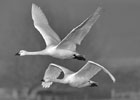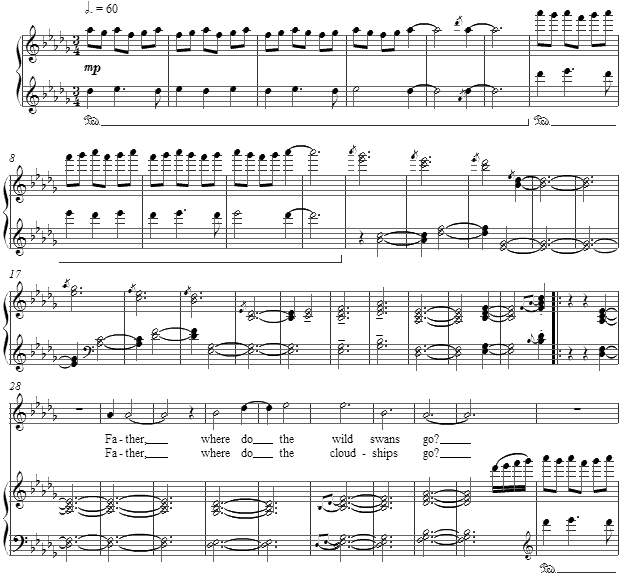Music and Texts of GARY BACHLUND
Vocal Music | Piano | Organ | Chamber Music | Orchestral | Articles and Commentary | Poems and Stories | Miscellany | FAQs
Father, Where Do the Wild Swans Go? - (2010)
Charles Wharton Stork, after the Danish of Ludwig Holstein
for high voice and piano
Father, where do the wild swans go?
Far, far. Ceaselessly winging,
Their necks outstraining, they haste them singing
Far, far. Whither, none may know.
Father, where do the cloud-ships go?
Far, far. The winds pursue them,
And over the shining heaven strew them
Far, far. Whither, none may know.
Father, where do the days all go?
Far, far. Each runs and races—
No one can catch them, they leave no traces—
Far, far. Whither, none may know.
But father, we—where do we then go?
Far, far. Our dim eyes veiling,
With bended head we go sighing, wailing
Far, far. Whither none may know.[ 5 pages, circa 4' 05" ]
This poem originally appeared in the November 1922 issue of Poetry. Charles Wharton Stork (1881-1971) was an American poet, playwright, novelist, editor of Contemporary Verse, from 1917-1925, translator of Scandinavian verse, as well as educator. Among his collections of translations was Anthology of Swedish lyrics from 1750 to 1915, and many others from Danish as well. The original text is noted in Poetry as by Ludwig Holstein, though much more of the poet is not readily available. Moreover, sometimes a translation becomes a work of art in of itself, and for this I state that Stork is author of this poem in English.
The notion of a simple question addressing ever deeper avenues of inquiry becomes form in these four stanzas. From wild swans, to clouds to days, and ultimately to the question of our ultimate end, this tender set of responses suggests that human inquiry must ultimately fall short. Knowledge is at best extremely limited, and time is short. For this, "where do we go?" is answered with an artistic "none may know," though many purport to know.
The setting moves back and forth between rushing gestures in the upper range of the piano, and longer chords to underpin the text's declaration. Like the rushing of distant wings, the quick-moving gestures should be gentle and in shades of mezzo piano and as noted the blurring of the pedal.
The score is available as a free PDF download, though any major commercial performance or recording of the work is prohibited without prior arrangement with the composer. Click on the graphic below for this piano-vocal score.
Father, Where Do the Wild Swans Go?

